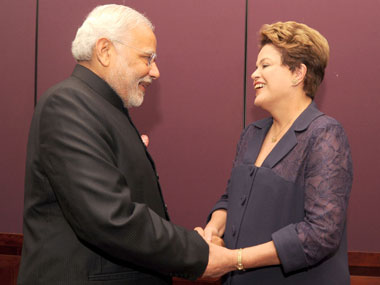Last week, after one of my presentations on Brazilian foreign policy at the School of International Studies at Jawaharlal Nehru University in New Delhi, where I currently conduct research, a student asked me a simple yet intriguing question. “Shouldn’t Brazil consolidate its regional leadership in South America before seeking a global role? If it is incapable of exercising leadership on the regional level, how does it justify claim to global recognition?”
Brazil is not the only so-called emerging power that faces this question. India is another good example. While India often sees itself on par with other global powers such as the United States and China, its attempts to assume a leading role in South Asia have shown mixed results at best. Virtually none of the ties to its numerous smaller neighbors are problem-free, not to mention India’s highly problematic ties to its larger neighbors, Pakistan and China. Can India become a global power as long as it is unable to assume responsibility, project regional stability or a clear vision for its troubled region? In the same vein, can Brazil rightfully seek global power status as long as it has not made up its mind of what role to play in South America?
It of course depends on how we define concepts such as leadership and power. Questioning Brazil’s and India’s claim to power on the premises on its shaky regional record implies that it is followers that make a leader. And indeed, followership matters. The United States’ claim to global leadership, for example, is credible in part because of its hard power. The US still spends about as much on its military than do all other nations combined. It is also the world’s no. 1 economic power. Yet this is not the whole story. Despite its flaws, the United States built a global system after World War II that is “easy to join and hard to overturn”, as Princeton scholar John Ikenberry put it. Today’s global system is essentially rule-based, democratic, constitutional, and it provides each country the opportunity to rise within the system – as the example of China, Brazil and India show. As the system’s creator, the United States thus continues to command a considerable global followership. Emerging powers seek a greater role within the existing system, not outside of it, so they are not fundamentally opposed to the system’s underlying principles.
In this context, it is useful to consider how the United States rose to the top. In 1823, one year after Brazil became independent, US President James Monroe told Europe’s leaders that any intervention in the Western Hemisphere would from then on be seen as an aggression against the United States. This policy, known as the Monroe Doctrine, was a unilateral declaration of regional hegemony by an emerging power. Yet contrary to today’s emerging powers whose interests are increasingly global, the United States consolidated its regional power for a relatively long time before turning into a truly global power in the twentieth century. The United States’ rise is an interesting example in that its regional preponderance can be seen as a first step towards global hegemonic status, even though the latter was not planned, but rather thrust upon the country. Yet is regional leadership necessary in order to assume global leadership? China’s increasingly assertive regional policy seems to indicate that it is close to announcing its own version of the Monroe Doctrine, although it is unlikely to do so explicitly to not antagonize the United States unnecessarily.
The global political context today strongly differs from 1823, so it is difficult to compare the rise of the United States with that of today’s emerging powers. In a globalized world, Indians argue, they can play a global leadership role even though they face several unresolved issues in their immediate neighborhood. But geography still matters. India’s ability to engage on a global scale would increase drastically if it signed a peace agreement with Pakistan, settled the Kashmir conflict and solved the border conflict with China. Not only would other countries more readily recognize India’s claim to leadership as more legitimate. India’s brightest strategists, still overly focused on China and Pakistan, could also begin to focus on other important global challenges such as climate change. “We’re essentially fighting with one hand tied behind our backs”, an Indian scholar says.
Successfully assuming regional leadership would thus certainly have positive consequences for both countries. For example, if Brazil could convince all South American nations to unanimously support its candidacy for a permanent seat on the UN Security Council, its chances to succeed would dramatically increase. The same applies to India. Yet the truth is that each country’s neighbors, notably Pakistan and Argentina, have been the most formidable obstacles in India’s and Brazil’s power project. Regional leadership, however, is difficult, costly, and full of risks. Brazil’s accommodating policy towards Venezuela, for example, has been sharply criticized, but taking a tougher stance towards autocratic leaders such as Hugo Chavez means running the risk of being called an imperialist in the region. India’s ability to influence the region is severely hampered by the presence of China. Lashing out against Myanmar’s junta is thus only likely to drive Rangoon deeper into China’s arms, an argument that is increasingly true for Venezuela as well.
The easier option for now is to assume “issue-based leadership”. Brazil and India have an enormous influence in the G77. They are key players in the Doha Trade Round as well as in the newly formed G20, and no deal on climate change can come into being without Brazil’s and India’s approval. Still, as they seek an increasingly important role on the global stage, pressure on Brazil and India to devise a more assertive regional policy is likely to grow.
Read also:
On the US-American hegemony over ideas that change the world
As Brazil turns into 6th largest economy, unfamiliar challenges loom
Photo credit: Courtesy PIB









